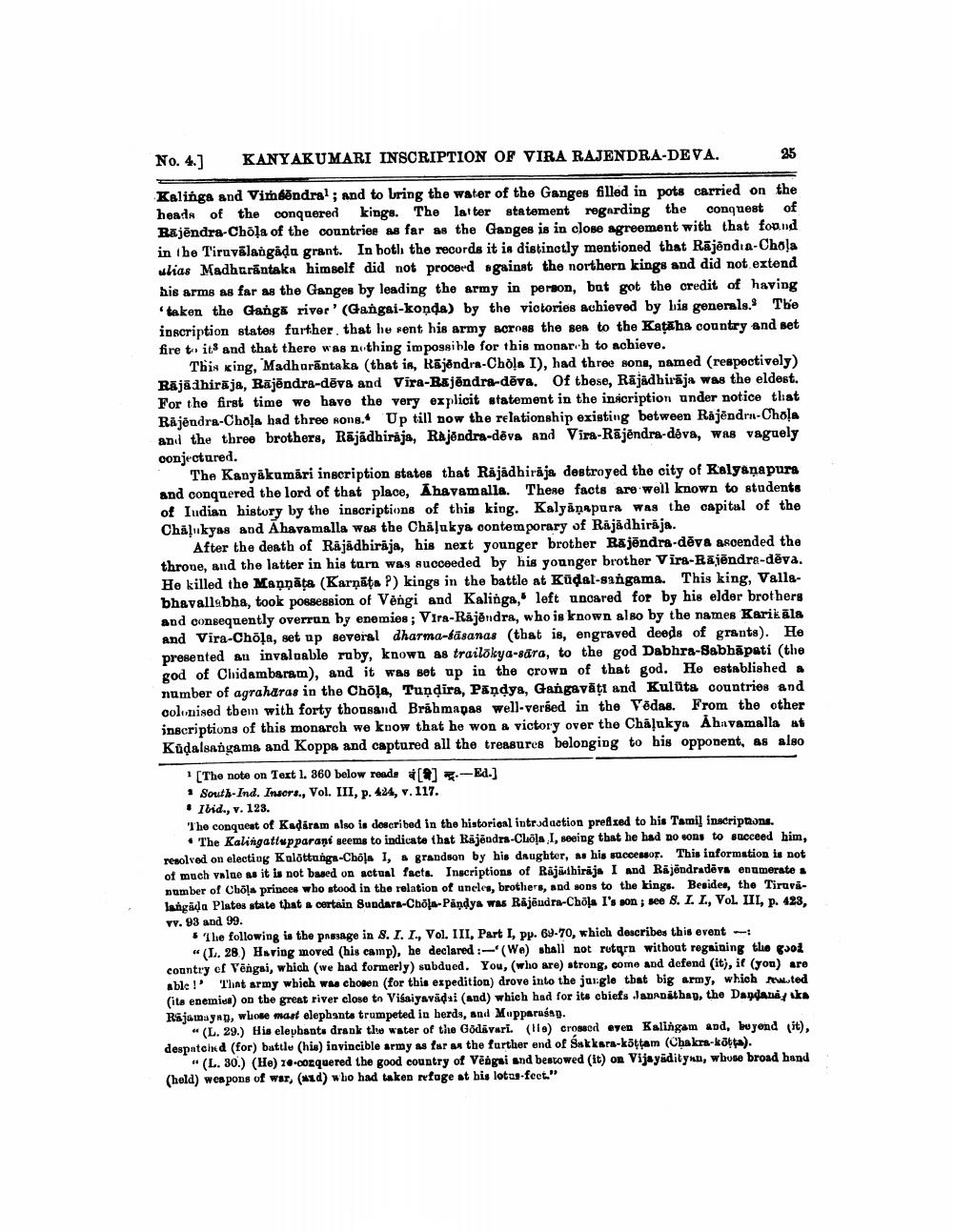________________
No. 4.]
KANYAKUMARI INSCRIPTION OF VIRA RAJENDRA-DEVA.
Kalinga and Vimgēndral; and to bring the water of the Ganges filled in pots carried on the heads of the conquered kings. The latter statement regarding the conquest of Rajendra-Chola of the countries as far as the Ganges is in close agreement with that found in the Tiruvālañgåda grant. In both the records it is distinctly mentioned that Rājēndia-Chola ulias Madhurāntaka himself did not proceed against the northern kings and did not extend his arms as far as the Ganges by leading the army in person, but got the credit of having
taken the Ganga river' (Gangai-konda) by the victories achieved by his generals. The inscription states further that he sent his army across the sen to the Kataha country and set fire tits and that there was n thing impossible for this monar-b to achieve.
This king, Madhorāntaka (that is, kājëndra-Chola I), had three sons, named (respectively) Rajā hiraja, Rajēndra-dēva and Vira-Rajēndra-dēva. Of these, Rajadhiraja was the eldest. For the first time we have the very explicit statement in the inscription under notice that Rajendra-Chola had three song.. Up till now the relationship existing between Rajēndrn-Chola and the three brothers, Rājādhiraja, Rajendra-dēva and Vira-Rājëndra-deva, was vaguely conjectured.
The Kanyakumari inscription states that Rajadhiraja destroyed the city of Kalyanapura and conquered the lord of that place, Ahavamalla. These facts are well known to students of Indian history by the inscriptions of this king. Kalyanapura was the capital of the Chåļikyas and Ahavamalla was the Chalukya contemporary of Rajadhiraja.
After the death of Räjädbiräja, his next younger brother Rajëndra-dēva ascended the throne, and the latter in his turn was succeeded by his younger brother Vira-Rājēndra-dēva. He killed the Mannāts (Karnata P) kings in the battle at Kudat-sangama. This king, Vallsbhavallabha, took possession of Vèngi and Kalinga, left uncared for by his elder brothers and consequently overrun by enemies; Vira-Rajendra, who is known also by the names Karikāla and Vira-Chola, set up several dharma-tāsanas (that is, engraved deeds of grants). He presented an invaluable ruby, known as trailokya-8āra, to the god Dabhra-Sabhāpati (the god of Chidambaram), and it was set up in the crown of that god. He established a number of agraharas in the Chola, Tuņdira, Pandya, Gangavāți and Kulüta countries and colunised them with forty thousand Brahmapas well-versed in the Vēdas. From the other inscriptions of this monarch we know that he won a victory over the Chāļukya Ahavamalla ut Kūļalsangama and Koppa and captured all the treasures belonging to his opponent, as also
[The note on Text 1. 860 below roade (2] .--Ed.] · South-Ind. Insors., Vol. III, p. 424, v. 117. • Ibid., v. 128. The conquest of Kadiram also is described in the historical intrudaction prefixed to his Tamil inscriptions
• The Kalingattupparani seems to indicate that Rajēndra-Clola I, seeing that he had no sons to succeed him, resolved on electing Kalottanga-Chola I, & grandson by his daughter, as his successor. This information is not of much value as it is not based on actual facts. Inscriptions of Räjähirija I and Rájöndradēvs enumerates number of Cbola princes who stood in the relation of uncles, brothers, and sons to the kings. Besides, the Tirarálangada Plates state that a certain Sundara-Chola-Pandya was Rájëndra-Chola I's son ; see 8. I. I, VOL III, p. 423, vv. 93 and 99.
The following is the passage in 8. I. I., Vol. III, Part I, pp. 69-70, which describes this event
" (L. 28) Having moved (his camp), he declared :-(We) shall not rutgrn without regaining the gol country of Vengai, which (we had formerly) subdued. You, (who sre) strong, come and defend (it), it (yon) are able! That army which was chosen (for this expedition) drove into the jungle that big army, which wted (ita enemius) on the great river close tn Visaiyavādui (and) which had for its obiefs Jananitha, the Dandana, ka Rajamayap, whose mast elephants trumpeted in herds, and Mupparusap.
(L. 29.) His elephants drank the water of the Godavari. (Ile) crossed even Kalingam apd, buyond it). despatched (for) battle (his) invincible army as far as the further end of Sakkara-kottam (Chakrs-kõtta).
" (L. 30.) (He) 76-00Equered the good country of Vengri and bestowed (it) on Vijayadityan, wbuse broad hand (hold) weapons of war, (zd) who had taken refuge at bis lotus-feet."




